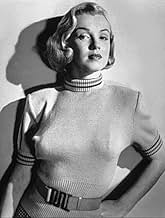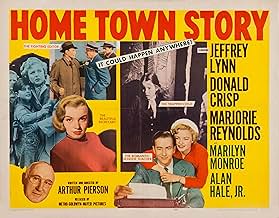अपनी भाषा में प्लॉट जोड़ेंAfter failing to be re-elected, politician Blake Washburn returns home and becomes editor of the local newspaper. When he notices the influence the paper has on the public, he uses it to app... सभी पढ़ेंAfter failing to be re-elected, politician Blake Washburn returns home and becomes editor of the local newspaper. When he notices the influence the paper has on the public, he uses it to appeal to potential voters in the next election.After failing to be re-elected, politician Blake Washburn returns home and becomes editor of the local newspaper. When he notices the influence the paper has on the public, he uses it to appeal to potential voters in the next election.
- Katie Washburn
- (as Melinda Plowman)
- Hospital Nurse
- (बिना क्रेडिट के)
- Jimmy
- (बिना क्रेडिट के)
- Don
- (बिना क्रेडिट के)
फ़ीचर्ड समीक्षाएं
The film contains social critical , drama and a little bit of comedy . The picture is short time , one hour approximately , for that reason is quickly seen and isn't boring . This is one of a handful of Metro-Goldwyn-Mayer productions of the 1950-1951 period whose original copyrights were never renewed and are now apparently in Public Domain . It appears notorious secondary actors as Donald Crisp (How green was my valley), he makes an intelligent speech about profits . And , of course , Marilyn Monroe , before becoming famous with Niagara (1953) she acted in various roles as a blonde sexpot secretary . Marilyn Monroe was often expected to provide her own wardrobe , in fact , the sweater with the grey body and black sleeves that she wears worn previously in Fireball (1950) and in the final scene in All about Eva (1950). The motion picture was regularly directed by Arthur Pierson . Rating : passable and entertaining.
Jeffrey Lynn is our star who has returned to his hometown in Hometown Story a defeated State Senator, defeated by Hugh Beaumont grandson of Donald Crisp who is the biggest employer in the area. Lynn takes over the newspaper and decides to use it to gain support for a comeback bid. And who to go after but the biggest target around.
And if you can't find an issue, create one. Lynn attacks what he labels the obscene profits of Crisp's firm and others like it. That sends Crisp into Lynn's office with a theory of capitalism and a defense of his business practices.
At first people might dismiss this film because in this day and age we now see what corporations like Enron and investment banks like Goldman-Sachs have done. But I would quote no less than Martin Sheen from Wall Street who says there is a great deal of difference between speculators like Michael Douglas and businessmen like Crisp who started the business and put their work and sweat into it.
Of course it would be interesting 60 years later to see if that Hometown Story now includes said firm moving to a foreign country or to some state with right to work laws and no environmental regulations. It's a complicated business with no easy answers.
Hometown Story would be gathering dust in a tin can at MGM's vaults if it weren't for the fact that Marilyn Monroe has a small role as a secretary at Lynn's newspaper. She's not Lynn's love interest, that's reserved for Marjorie Reynolds. But she does send Lynn's best friend and star reporter Alan Hale into a tizzy. The future skipper of the USS Minow has his hormones in overdrive.
Economics is not an easy subject for films and Hometown Story will not provide any answers. But it's pleasant enough viewing.
The movie starred Jeffrey Lynn as Blake Washburn - a one term state senator who's defeated for re-election and can't let it go. In fact he's the poster boy for sore losers, ready to pick fights with anybody who brings his defeat up, and convinced that the people were tricked into voting for his opponent. Frankly, he was a thoroughly unlikable character. Returning to his hometown, he uses his new position as editor of the family-run newspaper to criticize the man who beat him and to take on a variety of crusades, most notably against excess corporate profits. In that sense, the movie perhaps had some potential to provide a degree of social analysis, except that there was always question as to whether Washburn really cared about these issues, or whether he was simply using the paper as a platform to launch another election bid. In the end, the movie actually becomes a celebration of the system, as Washburn learns why profits are necessary, and how a company's profits benefit us all.
I found this most interesting for the very early look at Monroe, as well as for a look at a not bad piece of work from a young Alan Hale, Jr., who I know best as the Skipper from "Gilligan's Island." One thing really made me curious - how could Lynn play the brother of young Katie, played by Melinda Plowman, who got a few years as a bit player out of an acting career? Lynn would have been 42 when this was made, Plowman about 10. The family relationship was not at all believable. 4/10
Somehow they managed to wrangle Oscar winner Donald Crisp into a brief appearance, his last on screen work for three years-of course if this was the quality of stuff being offered no wonder he took a break, he's far better than this run of the mill junk deserves.
The real interest and the only reason the film is sought out today is for the presence in the cast of Marilyn Monroe and to a much lesser extent Gilligan's Island's Skipper, Alan Hale Jr.
Marilyn very much on the way up, her billing is far more prominent than the small part she plays would rate for anyone else, would play a few more minor roles like this throughout 1951. Within the year though she would be a minor star and within two a superstar permanently moving beyond this kind of routine assignment. She looks beautiful and handles the minimal demands of her secretary role well enough but she has a total of no more than five minutes screen time.
Strictly for those who are interested in seeing all of Marilyn's work, no matter how minor.
This unreleased GM inhouse movie was on TV as a late night movie recently (probably because it had two minutes of yet-to-be-a-star Marilyn Monroe in it), it was so awful I had to find out who wrote, directed and produced it. As I said, it was produced by GM - the writer and director was Arthur Pierson. Four years later Pierson would direct "Born In Freedom: The Story of Colonel Drake", a 30 minute movie about the beginning of the oil industry. I had read how US corporations produced a lot of these propaganda films (as well as books etc.) in the 1950's and tried to get them out there before they came upon more subtle and persuasive techniques and not this hard, bang-you-over-the-head with Soviet-style shoddy propaganda. If anything, this movie is an artifact of that happening, and perhaps interesting in that respect.
क्या आपको पता है
- ट्रिवियाMarilyn Monroe was often expected to provide her own wardrobe, a common practice in Hollywood at the time. The sweater with the grey body and black sleeves that she wears worn previously in The Fireball (1950) and in the final scene in All About Eve (1950).
- गूफ़When Blake arrives home, his mother is listening to a radio show that states it is a Saturday afternoon program, but the next morning (which should be Sunday) Katie gets on a bus to go to school.
- भाव
Iris Martin: I always treat men with respect so they do the same to me.
Slim Haskins: Let me know when that works!
- कनेक्शनFeatured in Vampira and Me (2012)
टॉप पसंद
- How long is Home Town Story?Alexa द्वारा संचालित
विवरण
- रिलीज़ की तारीख़
- कंट्री ऑफ़ ओरिजिन
- भाषा
- इस रूप में भी जाना जाता है
- Hometown Story
- फ़िल्माने की जगहें
- उत्पादन कंपनियां
- IMDbPro पर और कंपनी क्रेडिट देखें
- चलने की अवधि1 घंटा 1 मिनट
- रंग
- पक्ष अनुपात
- 1.37 : 1
इस पेज में योगदान दें




































